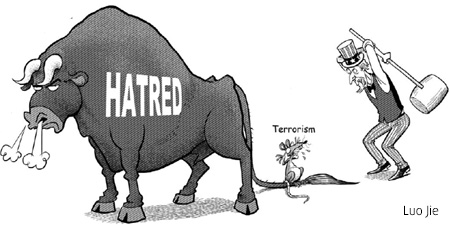Counter-violence alone can't curb terror

Christmas Day was scary for Americans, especially the passengers and crew of a Detroit-bound plane that Nigerian national Umar Farouk Abdul Mutallab attempted to blow up. No damage was done to the people on board or the plane but the incident made Americans more panicky, prompting the authorities to impose stricter security restrictions on fliers.
That Mutallab succeeded in boarding the plane and trying to blow it up shows America's anti-terrorism campaign has not worked well, leaving people to wonder whether there is a way to eliminate terrorism completely.
To some extent, the threat of terrorism seems to have made the international community agree that it can be countered through counter-violence. Terrorists want to spread political and psychological fear and counter-violence seems to be a reasonable way of dealing with them. But the problem is that we cannot rely on armed force alone to eliminate terrorism. Targeted killings can only destroy terrorists, but not the "spirit of terrorism", which will give birth of more of their kind.
| ||||
To exploit the success of their anti-terrorism campaign, the US and its allies have not only increased the number of troops in Afghanistan, but also carried out proxy wars. Hence, Mutallab's attempt to blow up the plane on Christmas Day can be seen as Al-Qaida's reaction to the US funding of a squad to fight terrorism in Yemen. On the other front, Pakistan, which the US is helping to fight terrorism, may have achieved some success against the Taliban, but the number of attacks on its soil has increased drastically.
The US government has listed terrorism as one of the top threats to its national security. To combat terrorism, it has not only intensified security inspections at home, but also initiated direct military action in some of the Arab countries. But fighting terrorism with counter-violence is far from enough to wipe out this real threat. We have to fully understand the roots of terrorism to eliminate it completely.
International terrorism is closely connected to globalization. Global terrorism is different from traditional wars between states. Most of the terrorists today are fighting for religion rather than national or individual interest. The violence they unleash is a kind of revenge toward the Western world.
It's surprising that many of Al-Qiada's key members are elites instead of people from the disadvantaged working class. A majority of them were born in wealthy families and received good Western-style education. Someone like Osama bin Laden could have been a successful businessman, but he chose to raise funds to train terrorists, launch attacks against Western countries and become the fountainhead of international terrorism. Mutallab is another example: He is the son of Nigeria's former minister of economics, and once studied in the UK and stayed in an apartment in London that was worth $4 million.
Globalization may have benefited many countries, but in some areas outside the Western world, people feel abandoned and victimized by it. They perceive it as a threat to their religion and culture, and feel antagonistic toward American culture and policy. Moreover, America's interference in the local politics of some countries to fulfill its interests, forces disadvantaged groups to organize and launch resistance movements against it. All these contribute to the making of terrorists.
Mutallab's former schoolmates were shocked after hearing of his attempt to blow up the plane. But those who become or aspire to become terrorists must have gone through some pain, suffering or anger against the West. They could have been discriminated against because of their religion or nationality, forcing them to see political reality in a different light.
More often than not, helpless people turn to religion for solace and some of them are drawn into terrorism. Others enter the cycle because they conform to the psychology of terrorism, even if they do not know who their "enemies" are.
Terrorist attacks have become more and more asymmetrical after the Sept 11 attacks. Facing counter-violence, terrorists see the giving up of arms as a mistake. This shows counter-violence succeeds only in deepening hatred and developing more feeling of revenge among terrorists. Hence, to eliminate terrorism, it is important to figure out the motivation that drives people to join terrorist groups and to take measures to prevent others from going the same way.
The lack of such efforts makes US President Barak Obama's appeal in Egypt for peace and mutual trust between the US and Arab countries wishful thinking. In Cairo, Obama said the US is a multi-racial melting pot, and the Arab people and Americans should cooperate in different fields. But he didn't say why terrorists harbored hatred toward the Western countries. Appealing for peace while taking military action makes his words meaningless. Obama may be a popular figure in the Arab world, but it is not easy for the Arab people to accept the Western world he represents.
Resolving religious and cultural conflicts, it seems, has become important than solving economic problems in order to eliminate terrorism completely. Universalism is one of the main motivations to have prompted the West to initiate many reform plans toward the non-Western world. But whether the non-Western countries are willing to be "reformed" is open to discussion. And under the dual pressure of universalism and pragmatism, it is hard to achieve racial harmony at the international level.
Generally speaking, mutual tolerance, communication and understanding are essential for achieving harmony. But all these can only guarantee the smoothness of the channels, and whether they can lead to positive effects is open to debate. Besides, conflicts related to complicated political interests make it even harder to eliminate the ingrained prejudice among different international sectors.
Instead of merely depending on military power to combat terrorism, we'd better emphasize more on long-term and flexible measures. The reason is quite simple: It's easy to destroy the enemies physically, but not the hatred they harbor, which will spread to others of their ilk. To wipe out terrorism, therefore, we should find a balance between military forces and public diplomacy. We have to first explore ways to eliminate hatred and enhance positive feelings in mutual interactions. If we focus on tough measures to combat terrorism, we will be assured only of temporary, and at times negative, safety. When it comes to eliminating non-traditional terrorism, traditional military measures are far from enough.
The author is a lecturer in International Studies at Beijing Foreign Studies University.

(China Daily 01/19/2010 page9)











